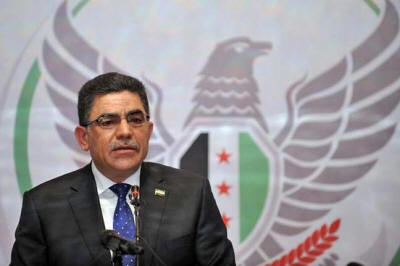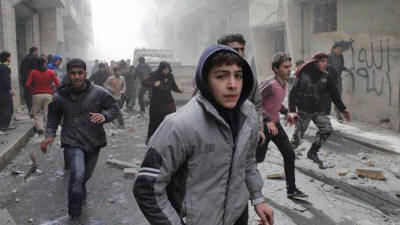
by Daniel McAdams
March 20, 2013
from
LewRockwell Website
In the name of democracy, the US government has
supported a variety of armed opposition fighters in Syria seeking to
overthrow that country's president, Bashar al-Assad, who according to a wide
variety of information sources
enjoys
support from the majority of the Syrian people.
So to promote democracy in Syria, the US
government has taken it upon itself to choose a new leader for Syria.
And in keeping with the US tradition of
supporting the
Chalabis of the world, this democratic answer to Syria's problems
lives in Dallas, TX, and was educated in Indiana. He has not set foot in
the country he now "rules" in more than thirty years. Also, he is, like the
other US puppets to emerge from the phony "Arab Spring" an Islamist from
the
Muslim Brotherhood.
That is what the US government calls "democratic
legitimacy."
It would be comical if the US was not
on the verge of attacking Syria, perhaps on the
false
Tonkin pretense that the Syrian government recently used a chemical
weapon in Aleppo. And irony is always lost on bullies: we are just ten
years out from the last time the neo-cons
neo-conned us
into a war based on a lie.
Oh... but this time it is different, we are
told.
This one is really for 'democracy'!
UPDATE
See
this fascinating interview for a glimpse of the real feeling on the
ground in Aleppo:
"People here don't like the regime, but they
hate the rebels even more...
I, and many other residents of Aleppo saw
firsthand how the armed rebels were acting on the ground, and the
various crimes and looting they were committing with impunity.
Another
reason is that there are foreign jihadi fighters with extremist
ideologies here."
New Syrian Opposition Leader
...Educated
in Indianapolis
by Robert King
March 19, 2013
from
IndyStar Website

Syria's main
opposition National Coalition newly-elected Prime Minister Ghassan Hitto
speaks today at a Syrian
opposition meeting in Istanbul.
Hitto is a former resident of
Indianapolis.
OZAN KOSE/AFP/Getty Images
A Syria-born American who lived, studied and worked in the Indianapolis area
was elected today as prime minister of the Syrian opposition.
Ghassan Hitto, 50, was chosen to lead Syria’s main exile groups. He
earned degrees in mathematics and computer science from Purdue University in
1989 after attending classes at its IUPUI campus.
Hitto was also a volunteer who helped stage the annual conventions of the
Plainfield-based Islamic Society of North America. He worked for the
North American Islamic Trust, an organization affiliated with the
Islamic Society, said Ahmed El-Hattab, an Islamic Society leader.
Hitto left the Indianapolis area several years ago and has been living in
Texas, but maintains friends here, particularly in the small Muslim
community in Plainfield.
As leader of the opposition in Syria, The New York Times reports,
Hitto will be funneling aid to rebels inside Syria who stand in opposition
to the government of President Bashar al-Assad.
El-Hattab, with the Islamic Society, described Hitto as ideologically
moderate.
“I think he will do a great job,” El-Hattab
said. “I have no doubt about it.”
Aleppo Activist Edward Dark
-
‘People Here Don't Like The Regime, but They Hate The
Rebels Even More’ -
by Stephen Starr
March 15, 2013
from
TheGlobeAndMail Website

Activist Edward Dark has been in Aleppo, Syria’s
second city,
since the outbreak of revolt.
Here he talks to Syria Live about life in the
city.
What is life in Aleppo like?
Is there electricity, water and internet access?
Can people go out shopping and visiting cafes?
What are people talking about on the street?
Are schools and university open?
The city is divided in half between rebel and government-controlled areas,
and getting from one side to the other is difficult and risky.
Most roads have been blocked off, and there is
very heavy traffic in the morning as people go about their business of
trying to get things done. By early evening, the city streets are almost
empty, hardly anyone at all ventures out at night. There are frequent and
long-lasting power and water outages.
The garbage hardly gets collected at all in some areas; there is hardly any
fuel, and what little there is is sold on the black market at
highly-inflated prices. There is a shortage of medicine, and most hospitals
have either shut down or are working in limited capacity due to shortages in
power, supplies and staff.
Many of the well-to-do residents, businessmen as
well as professionals, especially doctors, have fled the city and settled
abroad. The university is still open, but a lot of classes are getting
canceled and attendance is low.
Only a handful of schools are open, the rest
house displaced refugees and have no classes at all.
Until last year you were active
on Twitter, and then you left for a
time. Why were you forced offline, if that was the case?
There have been frequent internet outages in Aleppo. The longest one
lasted for just over a month. Add to that the terrible situation of the
power supply, which can go off for days at a time.
When you got back online, you presented a very different view of the
state of the uprising. What changed?
I, and many other residents of Aleppo saw firsthand how the armed rebels
were acting on the ground, and the various crimes and looting they were
committing with impunity. Another reason is that there are foreign
jihadi fighters with extremist ideologies here.
This wasn't what we revolted for, to replace
one group of criminals with another.
Aleppo has fallen off the map in terms of international media
attention recently. What is the state of play there now? How close are
rebel fighters from controlling the entire city?
The media pays attention to whatever fits their viewpoint and agenda
with regards to the conflict in Syria. It's very common to see certain
media stations either ignoring, exaggerating, and sometimes even
outright fabricating facts on the ground.
Aleppo has been in a stalemate for a long
time, and will likely remain so, hence the decreased interest in it. It
is highly unlikely that rebels can overrun the entire city. The regime
maintains a large force in the city, as well as a significant support
base among the population.
Is there broad support for the revolt in Aleppo today, or is it
localized?
People here don't like the regime, but they hate the rebels even more.
The economic hardships and harsh living conditions brought by the rebel
assault on the city [last July] added to their crimes and has
significantly eroded their support among the people here.
How divided is the city in terms of opposition to and support for the
revolt? Has it changed since the early days?
The city is divided in terms of support, yes. And as I have said
earlier, support for the revolt has waned ever since the rebel assault
on the city.
In your experience, are all rebel fighters dangerous and careless of
civilians’ lives, or just some?
In my experience, the majority of rebels show recklessness toward
civilian lives, as of course, so does the regime, but that shouldn't be
an excuse at all.
Some rebel groups are no more than organized
crime syndicates, opportunistically engaging in kidnapping, extortion
and large-scale looting of factories and warehouses.
The fact that the ‘good guys’ in the rebels
haven't been able to stop them casts a very dark shadow on all the
rebels here.
Roughly, what percentage of the city is in government hands and rebel
control respectively?
Roughly, you could say it’s evenly divided. But Aleppo is effectively
surrounded by rebel fighters, and all major highways into the city are
under various degrees of rebel control, making getting supplies here
very difficult, especially fuel.
Are there signs the government is increasingly losing control of the
city?
No, it’s in a state of stalemate. It doesn't look like it will be
changing anytime soon.
Were the rebels that began fighting government forces last summer
actually from the city? What does that tell us?
No, they were from the countryside around the city. That's another
problem, and adds to the hostility towards them from the city dwellers.


